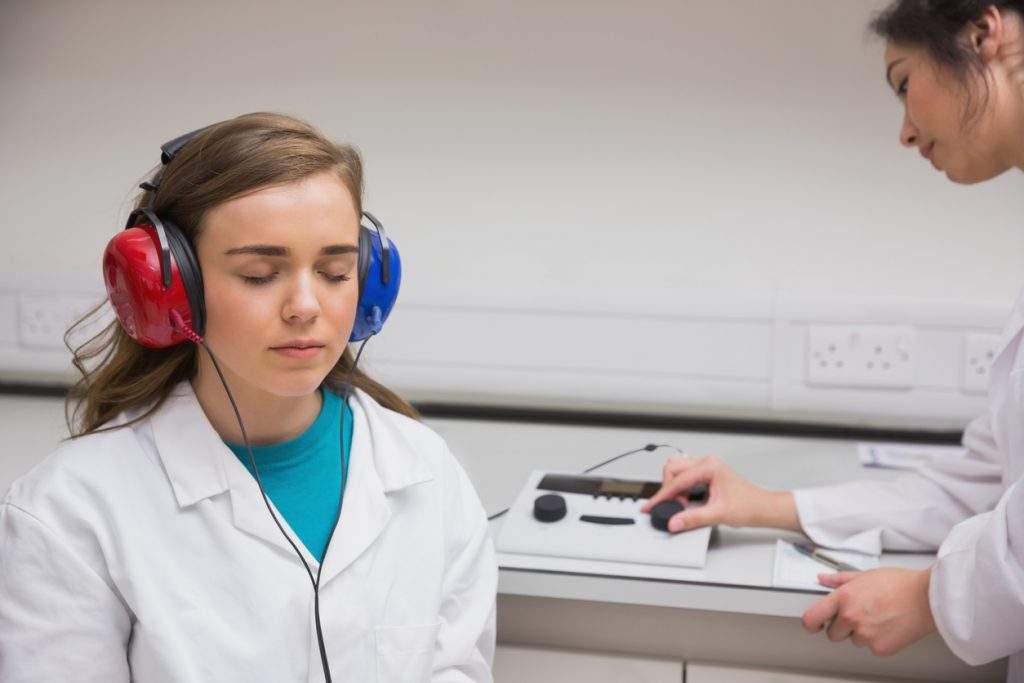For veterans filing claims for hearing loss with the U.S. Department of Veterans Affairs, the audiological evaluation is pivotal.
The importance of audiological evaluations
Comprehensive audiological evaluations are conducted by state-licensed audiologists to determine the presence and extent of hearing loss and whether it’s related to service.
For veterans, such evaluations are essential in establishing the service connection for hearing impairment requisite for obtaining VA benefits.
What happens during an audiological evaluation?
First, the VA is required to obtain a veteran’s Service Treatment Records before an audiological examination so the examiner can evaluate them in determining whether a veteran’s service caused or contributed to hearing loss. If something is missing from your records or you would like to highlight something about your hearing loss, make sure to let your audiologist know, either during the examination and/or in writing.
An audiological evaluation typically includes a series of tests to assess hearing sensitivity, speech understanding, and the health of the ear’s structures.
Before 1969, evaluations may have been in American Standards Association (ASA) units, so, if you have a copy of an older examination, it may need to be converted. Current testing standards are set by the International Standards Organization (ISO)/American National Standards Institute (ANSI), and Maryland Consonant-Vowel Nucleus-Consonant (CNC) testing, which measures hearing loss with a 50-word exam that scores how well you recognize spoken words. Modern tests might include pure-tone audiometry, speech audiometry, and tympanometry.
The examiner will be evaluating the ear to determine whether and to what extent there is hearing loss and whether that hearing loss is related to service. Note that a person can experience hearing loss but not necessarily have the severity of hearing loss required for VA benefits. Impaired hearing is considered a disability for VA purposes when:
- the auditory threshold in any of the frequencies 500, 1000, 2000, 3000, or 4000 Hertz (Hz) is 40 decibels or greater
- the auditory thresholds for at least three of the frequencies 500, 1000, 2000, 3000, or 4000 Hz are 26 decibels or greater, or
- speech recognition scores using the Maryland CNC Test are less than 94 percent.
If only a tinnitus examination is being requested and a hearing loss examination is on record, then the examination may be conducted by either an audiologist or non-audiologist clinician. If tinnitus is not claimed but is reported during the course of the examination, examiners will provide an opinion on its cause even when not solicited.
Linking hearing loss to military service
After determining whether hearing loss exists for VA disability purposes, the examiner will evaluate whether it is related to service. Audiological evaluations play a crucial role in this process. A veteran should explain to the examiner why the hearing loss is related to service. The audiologist’s report can provide evidence showing that the type and extent of hearing loss are consistent with the veteran’s military service and noise-exposure history.
That a veteran did not have hearing loss recorded in service is not a bar to benefits. Many VA examiners will conclude that hearing loss is not related to service simply because it was diagnosed after service, but this alone is an erroneous conclusion.
Navigating the VA claims process
The VA claims process for hearing loss can be complex. The audiological evaluation report is a vital piece of evidence, but it’s just one part of the claim.
Veterans also need to provide a detailed account of their service history and noise exposure as well as any medical records related to their hearing health. It might also be beneficial for friends or family members to write letters detailing the history and severity of a veteran’s hearing loss. For example, a letter from a neighbor about how the veteran struggles to hear during conversations can be helpful. Letters from friends and family should include a date stamp and information about the author, including how the author knows the veteran.
The impact of a well-conducted evaluation
A thorough and well-conducted audiological evaluation can significantly influence the outcome of a VA hearing loss claim. It not only substantiates the claim; it also helps in determining the level of disability benefits the veteran is entitled to receive.
At Vets National, we encourage veterans to understand the significance of audiological evaluations in their VA hearing-loss claims. These evaluations are more than just medical appointments; they are a critical step in obtaining the benefits veterans deserve for their service-related hearing impairments.
What to do after an audiological evaluation
After the evaluation, you can request a copy of the medical opinion and review it to make sure it is comprehensive and accurate. If you feel the examination was adequate, then you do not need to do anything. If you feel the examination was not adequate—either the examiner didn’t listen to you, your condition was different on that day, or the examiner was not qualified—then you should contact the VA immediately, either in writing or by phone, and detail the issues in the examination. You should report any examination inadequacies before the VA adjudicates your claim.
Need help with a hearing loss claim?
If you’re a veteran pursuing a VA hearing loss claim, remember the importance of a comprehensive audiological evaluation. Contact Vets National for assistance in navigating the VA claims process and to ensure that your audiological evaluation accurately reflects your hearing loss. We’re here to help you every step of the way in your journey toward acknowledgment and compensation for your service-connected hearing condition.






